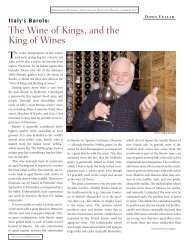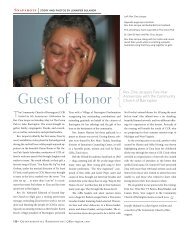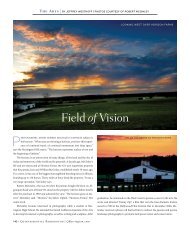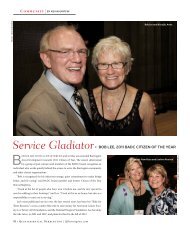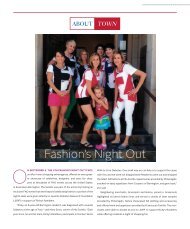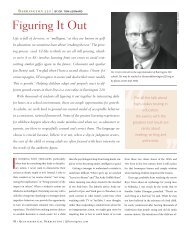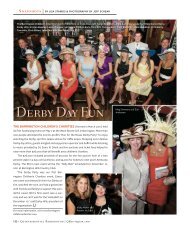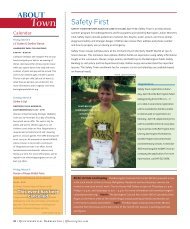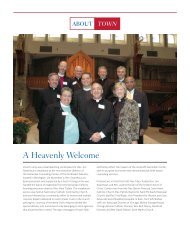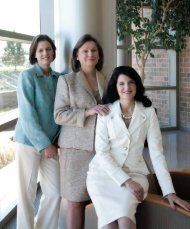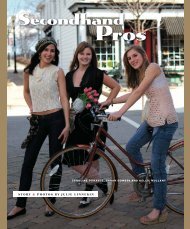Untitled - Quintessential Barrington Magazine
Untitled - Quintessential Barrington Magazine
Untitled - Quintessential Barrington Magazine
Create successful ePaper yourself
Turn your PDF publications into a flip-book with our unique Google optimized e-Paper software.
You’ll Never<br />
Swim Alone<br />
By<br />
David Rutter<br />
Photography by<br />
Julie Linnekin<br />
<strong>Barrington</strong> buddies Doug McConnell<br />
and Don Macdonald aim to swim the<br />
English Channel this summer. Even though<br />
they’ll be in the water by themselves, they’ll<br />
hardly be swimming alone. Hearts and<br />
minds will be them. This is a total family<br />
enterprise. That’s how it works. And it’s the<br />
most fun any of them have ever had.<br />
Doug McConnell and Don Macdonald are joined<br />
by their wives and daughters at Lake Zurich, where<br />
they both qualified to swim the English Channel. In<br />
front, from left: Ashley McConnell and Rachel Macdonald.<br />
In back, from left: Susan and Doug McConnell<br />
and Don and Jennifer Macdonald.
Susan McConnell photographed her spaghetti<br />
dinner as Lent arrived. She’s a professional<br />
photographer, but that fact was<br />
only coincidental. The onset of Lent was, too.<br />
She wanted an official record. She was saying<br />
goodbye to spaghetti. Her spaghetti. All spaghetti.<br />
Her daughter and three sons were there to salute<br />
their fallen pasta paisan, too.<br />
Fare thee well, noble carbohydrate. Adios,<br />
juicy meatballs. Via con Dios, dear, delicious meat<br />
sauce.<br />
Susan’s husband, Doug, and his buddy, Don<br />
Macdonald, are swimming the English Channel<br />
in August. Both gave up the glories of pasta and<br />
all related joys two years ago. Wrong food group<br />
to fuel an eight-hour swim in 60-degree open seas<br />
or the 35,000 yards they have swum every week<br />
since early 2010.<br />
They eat all the time. It’s just that it’s not, well,<br />
what you’d think of as food. It’s food-like components.<br />
Yummy isn’t the right word.<br />
Susan McConnell<br />
Susan hung on to pasta for as long as her conscience<br />
could stand it. But if Doug had to give up<br />
spaghetti, all the McConnells would, too.<br />
Little meals across town<br />
Over at the Macdonalds, things are slightly more<br />
serene. Don and Jennifer always have arisen before<br />
dawn for separate fitness exercise regimes.<br />
She is still getting used to him eating seven times a<br />
day – “all little meals,” she says – and that he plots<br />
to add at least 10 pounds for the swim.<br />
She thinks it must the “blubber protects us”<br />
theory of extreme sports. Don has calculated<br />
with precise mathematical precision – a little like<br />
Queeg chasing the strawberries – that he will burn<br />
7,000 calories for every 10 miles of Channel water<br />
he leaves in his wake. About 20,000 calories<br />
for the crossing – adding a few extra for the cold<br />
water - all of them he has to consume during the<br />
plunge. He is no idle day tripper. He has done serious<br />
thinking about this excursion into history.<br />
And as organized as life has seemed for Jennifer<br />
and 7th grade daughter Rachel, that won’t last<br />
as spring ripens into summer.<br />
It’s coming. It’s coming fast.<br />
“I would say I’m probably embarrassed to not<br />
appreciate the magnitude of this yet,” Jennifer<br />
says. “I hear and I understand about the mileage<br />
but I really can’t fathom what’s going through his<br />
mind about his hopes and fears as much as we<br />
talk. But when I’m in the boat halfway across the<br />
Channel while he’s swimming, I will suddenly realize<br />
what’s happening.<br />
The Boys From <strong>Barrington</strong> are doing the actual<br />
23 mile swimming. They'll be in the water on<br />
their own mostly. No one may touch them. It’s the<br />
rule. But they'll never be alone in the more spiritual<br />
human sense.<br />
This endeavor is a family event. A family quest.<br />
There is a community of announced sidekicks<br />
ranging from masters swimming compatriots to<br />
professional coaches to old sea dog pilots who will<br />
guide the experience. And of course, the spouses.<br />
Most especially, the spouses.<br />
Yours, mine and ours<br />
They’re all in the big game. But few have lived<br />
through two years of daily training with their<br />
Dad, Husband, Friend.<br />
“An obsession,” Susan admits. If Doug is going<br />
to do something this crazy, the rest of the family<br />
figures they can at least show solidarity by giving<br />
up their beloved spaghetti.<br />
Now there is a historical visual record of that<br />
commitment.<br />
And as much as the families try not to overthink<br />
the possibility of a less-than-glorious outcome,<br />
they are remarkably comfortable with what<br />
the men are doing and how they are doing it.<br />
“Is this like him?” Jennifer Macdonald says<br />
with barely a heartbeat to ponder the answer.<br />
“Without a doubt. I admire his focus and his ability<br />
to set a goal. He’s wanted to do this all his life.<br />
And I think it finally materialized when he found<br />
Doug as a swim partner and friend. That really<br />
motivated him. But this is really typical for D.J. He<br />
loves to have real specific objectives to reach for.”<br />
It’s not only important for supreme challenges,<br />
such as swimming the Channel, to be supported by<br />
loves ones; it also helps if they really believe it can<br />
succeed. And to be historically accurate, not everyone<br />
who tries to swim the Channel succeeds.<br />
104 • <strong>Quintessential</strong> <strong>Barrington</strong> | Q<strong>Barrington</strong>.com
photo: SUSAN MCCONNELL<br />
From left: Billy, Gordy and Doug McConnell in Boston following the 2010 Boston Light Open Water Race. (Not pictured is Mack McConnell, who lives in San Francisco<br />
and works for Intuit Inc.)<br />
Are they ready? “They’re on their way to being<br />
ready,” says Marcia Cleveland, their advisor of<br />
record and one of the world’s exalted doyens of the<br />
deep. She set up the complex latticework of swimming<br />
intervals, lengths, times, and practice intensities<br />
that, when considered as a whole, becomes<br />
The Plan. She, above all, knows you can’t swim the<br />
Channel without mastering The Plan.<br />
Cleveland, a mother of two who lives in Winnetka,<br />
has conquered most of the planet’s long-distance<br />
ocean swims. She stroked from Catalina Island<br />
to California (23 miles) in the dark. And more<br />
to the point for this exercise, she swam the Channel<br />
in 1994 as a 30th birthday present to herself.<br />
“She’s his coach, but so am I,” Susan says.<br />
“I’m comfortable because he’s comfortable,”<br />
Jennifer adds. “He’s right on track with where he<br />
wants to be. I think it even helped when he tried<br />
the first time to qualify (a required six-hour swim<br />
in 60-degree water) and he didn’t make it. The<br />
water was just a little colder and for every degree<br />
colder, it multiplies the cold for the swimmer by<br />
10 times. So he had the experience of being shivering,<br />
cramping and totally miserable. I think he<br />
now is totally prepared both mentally and physically.”<br />
Once it was clear where the first discussion of<br />
this plan was headed, both women gave up trying<br />
to change anyone’s mind. As if they could.<br />
“He has greatness in him,” Susan McConnell<br />
says of Doug. “He had talked about it, but it took a<br />
partner to pull it out of him. It’s been two years of<br />
training. Age (he’s 53) is pushing the timing. He’s<br />
really been preparing for this his whole life, aiming<br />
for this. This is the next thing, the logical step.<br />
I always saw it in him. I didn’t know quite how<br />
defined swimming was in his life, but this solidified<br />
things and made sense to me.”<br />
The McConnells have thrown the entire family<br />
of husband, wife, and four children into the com-<br />
ing battle with the cold water trip from Dover to<br />
Calais. “Doug leads a very creative life. We have<br />
four kids and three are adopted if that gives you an<br />
idea,” Susan adds. “So he’s capable of doing almost<br />
anything.”<br />
Mack (23), Billy (19), Gordy (17) and Ashley<br />
(13) all have their specific roles in the McConnell<br />
Swimming Circus. Just making sure everyone is<br />
in the right place at the right time is hard enough.<br />
“Had no idea this project we’ve undertaken was so<br />
big,” Susan says. “It’s a bunch of gigantic projects<br />
all wrapped up in little patches. Three of the kids<br />
are lifeguards who can go with him on open water<br />
swims and be his guides. Billy has hand-built<br />
a kayak from scratch, so he could go along in the<br />
water.”<br />
It’s well for Susan that her children all are<br />
strong swimmers, especially if she falls out of the<br />
crew boat. She can’t swim, and shows no motivation<br />
to learn at this point.<br />
Q<strong>Barrington</strong>.com | <strong>Quintessential</strong> <strong>Barrington</strong> • 105
Rachel, Don and Jennifer Macdonald<br />
embrace after Don finishes the 2010<br />
Light Open Water Race in Boston last<br />
August.<br />
photo: SUSAN MCCONNELL<br />
Jennifer Macdonald<br />
Rachel Macdonald is a topflight junior swimmer.<br />
Jennifer Macdonald can swim, but won’t,<br />
“Unless something big is chasing me.”<br />
Has this been fun? Or is that the wrong word?<br />
Up at dawn. Trips to open water marathons in lagoons<br />
and bays you’ve never heard of. It can be<br />
numbingly cold at 4 a.m. Plus, life turned upside<br />
down for a cockamamie quest. And clothes that<br />
never quite get dry.<br />
They have become water-born, ocean-fixated<br />
pollywogs. Surely, it’s not all fun.<br />
“It’s been a blast,” Susan says. “So totally fun for<br />
the whole family. At the end of the day it’s the best<br />
thing that ever happened to us. All the kids have<br />
found that there is nothing you can’t do.”<br />
Sometimes the task seems too large to comprehend<br />
comfortably. “I am in awe of what they<br />
are doing,” Jennifer adds. “I can’t quite grasp the<br />
magnitude of it. It’s gonna be a once-in-a-lifetime<br />
experience.”<br />
Channel swim royalty<br />
That anticipation will ripen into reality on Aug.<br />
24. It’s D-Day for Don and Doug in Dover. The<br />
families and Cleveland will all stand aside, and<br />
turn Don and Doug over to Michael Oram and<br />
his son, Lance.<br />
The Orams operate the Dover Sea School and<br />
are the royalty of the Channel’s swimming support<br />
infrastructure. Have been for three decades.<br />
They literally are the “Pros from Dover.” The<br />
accredited pilots have ultimate authority over<br />
each expedition. They operate the support boats,<br />
manned by their safety teams and also toting the<br />
swimmer’s personal cohorts. Everybody is going.<br />
But the pilots are not a taxi service; they maintain<br />
constant vigil over the progress of the swim.<br />
They are Mission Control.<br />
Michael, 62, has guided 500 crossings, many<br />
of them world record achievements. Lance has<br />
more than 300. Dad’s success rate is 75 percent<br />
and Lance’s charges have made it 77 percent of the<br />
time. Good odds. Both numbers are considerably<br />
higher than the average for pilot competitors.<br />
No one has guided more swimmers on their<br />
trip to France (some were roundtrip ventures)<br />
than Michael Oram, who was honored for his<br />
skills with an induction into the International<br />
Marathon Swimming Hall of Fame. But the<br />
Orams are not merely hired hands. The candidates<br />
for these Channel swims apply for acceptance,<br />
present themselves to the pilots for close inspection,<br />
and the pilots ultimately decide if they will<br />
take the job.<br />
“They pick people who they believe can do it,”<br />
Susan says.<br />
More than the $3,000 pilot fees each for Mc-<br />
Connell and Macdonald are at stake. Professional<br />
reputation is on the line, too, as well as the lives<br />
of the swimmers, for the Channel is a dangerous,<br />
hostile environment and the churning, frigid water<br />
there can be unforgiving of error. That is why<br />
preparing for the swim has taken two years of<br />
daily, grinding physical preparation. But success<br />
requires intelligent partnerships.<br />
The Orams have done this long enough to<br />
judge which candidates are more likely to be<br />
seaworthy. And it didn’t hurt that Cleveland was<br />
the coach of record. Her name carries a cachet in<br />
this realm.<br />
Thus, less than 10 hours after slipping into<br />
the waters, they both will stride ashore in France<br />
triumphantly. Fingers crossed. Knock-on-wood.<br />
No one says “if.” At this point, there is little room<br />
for “ifs.”<br />
No one in either family has the exact specifications<br />
for the post-swim celebration that will mark<br />
the pair’s arrival in Calais.<br />
But it’s a good guess that spaghetti and meatballs<br />
will be a part of it.<br />
106 • <strong>Quintessential</strong> <strong>Barrington</strong> | Q<strong>Barrington</strong>.com
Don and Doug Swim For Their Causes<br />
Both Don Macdonald and Doug McConnell have much more in mind<br />
for their Channel swim than reaching the shore of France. Both men<br />
have causes near and dear to their hearts. They encourage us to participate<br />
in their swim and their causes. For more information, please<br />
see below and visit the websites listed for each.<br />
Don Macdonald has teamed up with the <strong>Barrington</strong> 220 Educational<br />
Foundation, with particular interest in the support of social emotional<br />
learning for district students. Don, formerly of Goshen, Ind., blogs about<br />
his journey to swim the English Channel. Don discusses his three-year<br />
planning, expert advice from previous Channel swimmers, training,<br />
planned milestone swims and community charity efforts from soup<br />
to nuts.<br />
Doug McConnell will be swimming the English Channel in support<br />
of the fight against ALS, also known as Lou Gehrig’s disease. 100<br />
percent of the proceeds will go to support groundbreaking research<br />
at the Les Turner ALS Research Laboratory at Northwestern University,<br />
one of the top ALS research laboratories in the world.<br />
Visit www.alongswim.com to learn more or to donate.<br />
Susan McConnell, Doug’s wife, blogs about her experiences from a<br />
spouse’s perspective.<br />
Visit www.mybionicboyfriend.com to learn more.<br />
Visit www.one-stroke-at-a-time.blogspot.com to learn more or to<br />
donate.<br />
Rachel Macdonald and Ashley McConnell’s friendship was a catalyst to the introduction of their fathers who both qualified to swim the English Channel last summer.
Jennifer Macdonald and Susan McConnell
Marcia Cleveland is the 445th person to<br />
swim the English Channel. This photo was<br />
taken in Maine in 1994 by her mother,<br />
Carolyn Cleveland.<br />
CLEVELAND<br />
ROCKS<br />
Winnetka mom Marcia Cleveland looks like your next door<br />
neighbor because she is. But she swam the English Channel<br />
in 1994 and since has become one of the world’s top advisors<br />
and organizers for open water swimming. She’s famous<br />
in her universe, though you might not have heard of her.<br />
She’s a Master Swimmer who is sought out worldwide for<br />
her knowledge. She’s advising two <strong>Barrington</strong> men now on<br />
how to swim the Channel in August. But her place in the<br />
world was not so predictable. She was scared out of the<br />
ocean by Steven Spielberg’s “Jaws” at age 11 and didn’t get<br />
back in the deep water until she was 23.<br />
<strong>Quintessential</strong> <strong>Barrington</strong>: The year you swam the English Channel, 1994,<br />
doesn’t seem like a long time ago. But the years pile up. What most do you<br />
remember about the day you swam the Channel? What do you still feel in<br />
your mind when the moment comes back to you?<br />
Marcia Cleveland: Remembering that is one reason I wrote the book (the<br />
“Bible” of Channel swimming, “Dover Solo”) because I wanted a memoir so<br />
that I could remember everything. People always ask about it and this summer<br />
it will be 17 years. It’s just that life was so different then being at a world<br />
caliber level. What I remember vividly, of course, was the pain in my shoulders<br />
and the cold. But I mostly remember what it felt like when my hands<br />
touched the rocks (on the French shore). It was this feeling of complete relief.<br />
QB: Why relief?<br />
MC: You say to yourself: This is one of those days when you really feel like<br />
you’ve done something in life. When you’re over there, all of these people<br />
are involved in the same thing and it seems almost usual. My life had been<br />
focused on that for such a long time. It was just my life. But the further you<br />
are removed it, the more you realize how big of a deal it was. Not everybody<br />
can get it together to do this. So in reflection – and even now – it sort of<br />
amazed me that I could get myself to do this. Doing the training, everything,<br />
every day. It’s even innovation of the training. I had a fulltime job at the time,<br />
I was married, I was tired a lot, and I was just able to have my big girl pants on<br />
every day. It took me five years to write the book. But it gave me perspective.<br />
QB: Was the experience of the Channel swim what you thought it would be?<br />
MC: Much better, a thousand times better. Before you swim you think it’s<br />
going to be hours of agony and misery, but you get yourself so physically and<br />
mentally prepared. First, my first hour in the water was in the dark, and I had<br />
not prepared for that; so I was scared out of my mind. But then you realize<br />
you are in your element. You are rocking and rolling. So you never whine<br />
or cry. My husband and a friend were in the crew boat and they were in<br />
their element, too. You begin by thinking it’s going to be 150-foot waves and<br />
10-degree water. But you get so really, really ready. And once you start doing<br />
it, you don’t pay any attention to that.<br />
Q<strong>Barrington</strong>.com | <strong>Quintessential</strong> <strong>Barrington</strong> • 109
QB: Is this the hardest swim in the world?<br />
MC: Actually not. Lynne Cox swam the Bering Straight and there was her<br />
swim to Antarctica. And the Irish Sea is really hard, 55 degree water and huge<br />
jelly fish. Most humans can’t do that. So K2 is a harder to climb than Everest.<br />
But not nearly as famous. It’s just that the Channel is the most famous swim.<br />
QB: You were a great kid swimmer in high school (her school was undefeated<br />
her junior and senior years) and college. So was this long distance swimming<br />
the obvious next thing for you? Were you built for this?<br />
MC: I think when I was a kid, I “left a lot of money on the table” as they say.<br />
I did OK. I never had much speed; sort of the ball and chain. I never really<br />
blossomed. Coaches then just had a high decibel level. But when I swam my<br />
last race for Yale, I was more interested in how good the glass of beer was<br />
going to taste. I didn’t have the right approach. So when I started swimming<br />
Masters level, I did eight lifetime bests in 10 years. That’s a lot.<br />
QB: But you prepared as a kid by swimming in the ocean off Connecticut?<br />
MC: Not really. I saw the movie “Jaws” when I was 11. And I didn’t go into<br />
the ocean for 12 years. It had really scared me to death. I didn’t even start this<br />
open water swimming until I was 23. I was suddenly around older swimmers<br />
who were brave and they just tugged me into the water. And before I<br />
knew it, I was doing marathons around New York. It makes me a little more<br />
understanding of swimmers’ fears now (as a teacher) and how they can have<br />
a thousand fears and phobias in the open water. Like a blade of grass touches<br />
you, and you think it’s a jelly fish. Then you gradually start to learn that you<br />
are going to get through this.<br />
QB: So, besides being physically prepared for open water, how did you<br />
change your mental approach?<br />
MC: When I got out of college, lots of things started to go wrong and get<br />
complicated. I was having to be a grownup. And swimming became my security<br />
blanket. When you have a good day or a bad day, you get into the water<br />
and let out your joys and sorrows. It was better than the drugs of choice others<br />
had. That is very typical of swimmers. You can always say to yourself: I<br />
swam today and everything is OK. So I moved to New York, got a job in six<br />
days and decided to go swimming at a YMCA on the Upper West Side. I just<br />
happened to walk into a Masters Class. I started to realize I was on my own.<br />
My own boss. I was in charge and it was all on my own terms. I was both the<br />
prisoner and the warden.<br />
QB: Is long distance swimming a human athletic talent, or is a question of<br />
mostly consuming will power?<br />
MC: It’s the first option. You have to be good swimmer to do this.<br />
QB: In your book, you describe the level of repetitive work required to be<br />
fit enough for these open water events as if you were describing a recipe for<br />
lemon meringue pie. But I would guess not a lot of people can do that work<br />
– 40,000 yards of swimming in a week for two years – or would even want<br />
to do it.<br />
MC: When it comes to preparing to swim the Channel, the road to hell is<br />
paved with good intentions. In this society, everybody wants to be the red<br />
race car. Some weekend warriors may do really well against the cold once, but<br />
then the next day they don’t want to get out of bed. When I started working<br />
with Don Macdonald and Doug McConnell (in <strong>Barrington</strong>), I sent them the<br />
workouts for every day, and they are expected to do it. I’m not forcing anyone.<br />
But they both know what’s at stake. The fact they have many other things<br />
going on in their lives is OK. These workouts are designed for real people.<br />
QB: Doug McConnell and Don Macdonald seem serious about this. I would<br />
guess there’s no other way to make this swim than to be serious about preparing<br />
for it.<br />
MC: Yes, as teacher and coach I have to know what your real story is. But I<br />
can smoke out people quickly. Don and Doug have yet to give me any excuse.<br />
Like, “Ooo, I broke my toenail.” But they are in it for the real reasons. I’ve<br />
had people who are not committed. Some want the dream and the ideal, like<br />
a knight on a white horse. But real life doesn’t go that smoothly. If I decide<br />
you’re not able to do this, I’ll say you need to think about it and then call me<br />
when you decide what to do.<br />
QB: Do your children know what swimming the English Channel means? Do<br />
they want to “beat mom?”<br />
MC: I think my daughter has read “Dover Solo” but I don’t know if Sam has.<br />
My husband hasn’t read it because he lived through it. It’s not exactly required<br />
reading in the house. (Chuckling). Sam swims for the Michigan Shore<br />
team. Julia swims for the New Trier club, and she’s doing very well. We did<br />
a swim together last summer off Long Island Sound. She is in the middle of<br />
this group of my friends who are like her extra moms. She has a lot of people<br />
in swimming who care about her. I’ve told them that if they ever want to stop,<br />
it’s fine with me. It was not to be mean. They aren’t swimming for me. But<br />
there isn’t much pressure to “show up mom.” She’s already beaten 11 of my<br />
lifetime bests.<br />
QB: How does that make you feel?<br />
MC: She takes delight in that, and so do I. It’s fun to see her kick my butt. Of<br />
course, if she wants to inherit Aunt Mildred’s couch pillow, that’s OK with<br />
me, too.<br />
QB: What’s your best estimate of how ready McConnell and Macdonald are<br />
for the swim?<br />
MC: Good as long as they do the training. But there are no guarantees, and I<br />
would be a fool to give any. They know that totally.<br />
QB: What happens when swimmers don’t succeed?<br />
WC: It’s a lack of preparation obviously. Or the weather deteriorates. Or the<br />
swimmer gets sick from what they eat when they swim. You get tired. You get<br />
cold. Or some just give up. That’s a bad omen in life. Sometimes the pilot does<br />
call off the swim because he has the final say. Obviously when this happens,<br />
everyone is tremendously disappointed. Not so much the swimmer right<br />
away. Because when you get out of the water because of hypothermia, the<br />
boat has been looking really good to you for a long time.<br />
QB: Do they fit the training experience model of your other students who<br />
have made it?<br />
110 • <strong>Quintessential</strong> <strong>Barrington</strong> | Q<strong>Barrington</strong>.com
MC: They are doing what they need to do to be successful, to give them a<br />
chance to be successful.<br />
QB: How many have you tutored for the Channel?<br />
MC: It’s more like advised. About 25. Maybe 10 have made it. Some have<br />
started the training but dropped out because they couldn’t do it.<br />
QB: Are there other successful Channel swimmers in the area?<br />
MC: Maybe two dozen or so total in the Chicago region, although no one<br />
who is super young because that doesn’t help. Older swimmers are more<br />
patient. Maybe two or three in the Chicago area.<br />
QB: Does the event change you?<br />
MC: I think what it did was showed me the value of real hard work, and it was<br />
totally up to me to succeed. I could decide when to end it at any time. Nobody<br />
was holding me to this. But being able to put together a big project – there are<br />
lots of people who cared and helped – was something special. It helps on those<br />
horrible days when you can get it together. It’s helped me be a better parent.<br />
QB: Can a person really know what it took to swim the Channel without<br />
having done it? Is this one of those human events with a closed enrollment?<br />
MC: That’s part of mystique, and it’s true. This thing is not a dime a dozen.<br />
Sometimes someone will say they want to swim the Channel and even when<br />
they take baby steps, they say “Oh my God. I didn’t know what was involved.”<br />
That’s what brings the fraternity closer together of those who have done it.<br />
The mutual respect. When they come back, they don’t need medals or attention.<br />
You can just see it in their faces.<br />
QB: I have never read an account of your exploits that goes long without<br />
noting how important a person you are in the sport worldwide as a teacher<br />
and leader. Are you comfortable being called one of the half dozen most significant<br />
persons in your sport?<br />
MC: I never expected to be important. But there are several of us women at<br />
the top. Every year, we go back to England for a party. It’s great to see everyone<br />
and see what they’ve done in the last year.<br />
QB: How much time do you spend in water each week in warm months and cold?<br />
MC: Right now about 25,000 yards a week, about 14 to 16 miles. That’s seven<br />
or eight hours. When I did the Channel, it was 45,000 yards in 20 hours<br />
a week, and then up to 25 hours a week. In the summer it’s about 50-50<br />
between the pool and open water (usually Lake Michigan). I often use the<br />
pool to work on speed. But you don’t waste time, like with polar bear activities<br />
or goofing off like that.<br />
QB: Tell me something about you that almost no one knows.<br />
MC: I like to knit. I’m totally mediocre at it. But I just love it. I’ve knitted my<br />
husband lots of sweaters. Right now, I’m working on a washcloth. It helps<br />
keep my expectations low.<br />
QB: What will you do next? Do you fear the Alexander the Great Syndrome:<br />
crying because there are no worlds left to conquer?<br />
MC: Nah, that’s not me at all. Maybe (swimming the Straits of) Gibraltar. My<br />
husband loves Spain.<br />
In 1994, Marcia Cleveland is joined by her husband, Mark Green, to savor the<br />
ultimate finish for a swimmer – completing the English Channel swim.<br />
Marcia Cleveland – Anatomy of a<br />
MASTER Swimmer<br />
Marcia Cleveland, 47, has lived with her husband of 20 years, Mark<br />
Green, in Winnetka for the past eight years. Their two children are<br />
Julia, 13, and Sam, 11.<br />
She is a professional long-distance swimming coach, coach for Vision<br />
Quest Triathlon Group on the North Shore, Master Swimming<br />
organizer, a Girl Scout Troop leader and member of The Women’s<br />
Exchange. She grew up in Greenwich, Conn., and graduated from Yale.<br />
She is serving a four-year term as the national chair of the United<br />
States Masters Swimming Open Water and Long Distance Committee.<br />
The resume<br />
In 1994, she swam the 23.69-mile English Channel in nine hours, 44<br />
minutes. She was the 445th to swim the Channel.<br />
In 1996, she established the American women’s record for the 28.5<br />
mile Manhattan Island Marathon Swim in five hours, 57 minutes. It was<br />
her fifth Manhattan Marathon.<br />
In 2003, she swam the roundtrip English Channel route as part of a<br />
relay team.<br />
In 2005, she swam the 23-mile Catalina Island Channel in the Pacific<br />
Ocean and reached California’s coast in eight hours, 56 minutes, virtually<br />
all of it at night.<br />
The work<br />
As a 30-year-old, she averaged 45,000 yards a week swimming for a<br />
year before her English Channel swim.<br />
As a 40-year-old mother of two, she averaged 25,000 yards a week<br />
before the Catalina swim.<br />
In the water<br />
As she swam the Channel, her head filled with the B-52's version of<br />
the Flintstones theme song, a singing rendition of the ABC's stroke<br />
by stroke, and the British pop song, “I Saw the Sign.” Cleveland was<br />
also fueled by feedings which consisted of 30-60 second stops<br />
where liquid would be handed over the side of her support boat.<br />
She would tread water while gulping either chicken broth, watery<br />
oatmeal or Nutrament – and then begin swimming again.




